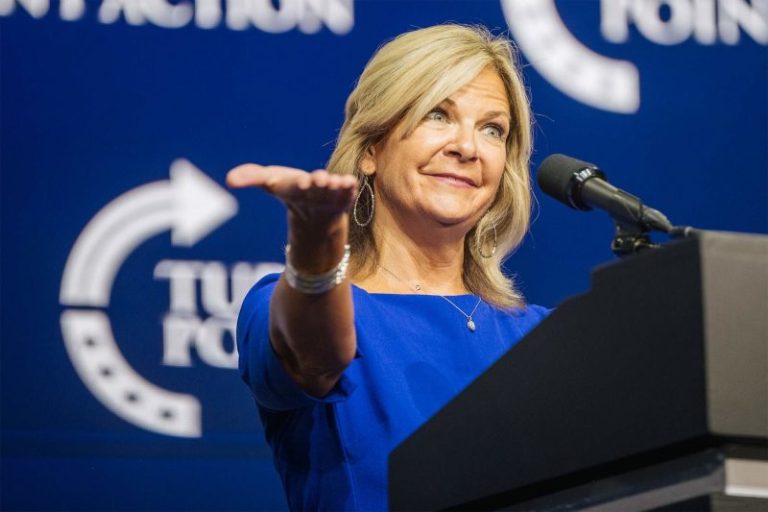The Supreme Court on Monday turned down a request from the head of the Arizona Republican Party to shield her phone records from the congressional committee investigating the Jan. 6, 2021, attack on the Capitol.
A divided three-judge panel of the U.S. Court of Appeals for the 9th Circuit had said it was proper for the committee to issue a subpoena seeking information about calls placed from Kelli Ward’s cellphone between November 2020 and January 2021. The information would not include the content or location of the calls.
Ward argued that demanding the information would violate her First Amendment right to freedom of association. “In a first-of-its-kind situation, a select committee of the United States Congress, dominated by one political party, has subpoenaed the personal telephone and text message records of a state chair of the rival political party,” Ward’s lawyers told the Supreme Court.
Ward also speculated that investigators intended to call all those whose numbers showed up, adding “There can be no greater chill on public participation in partisan politics than a call, visit, or subpoena, from federal investigators.”
The Supreme Court’s decision not to shield the records came in a short, unsigned order on Monday. Neither the majority nor the justices who noted their dissent — Clarence Thomas and Samuel A. Alito Jr. — explained their reasoning.
Thomas has been criticized for taking part in decisions involving the 2020 election and the Jan. 6 committee. His wife Virginia “Ginni” Thomas has testified before the committee, and sent emails to Arizona legislators saying they could object to Joe Biden’s popular vote victory in the state and “choose” presidential electors.
The committee told the Supreme Court that Ward “played a significant role in attempting to overturn the 2020 election,” and that she invoked the Fifth Amendment to avoid answering questions about her role when she appeared before the committee.
“Dr. Ward participated in several improper efforts to subvert the will of the American people as expressed at the ballot box, culminating in a fake-elector scheme that was instrumental in leading to the January 6th attack,” the committee’s filing says. “At best, her arguments amount to a claim that she has an absolute right to attempt to overturn a Presidential election, yet at the same time Congress cannot take reasonable investigative steps to learn more about that plan that had such disastrous consequences for our nation.”
The 9th Circuit panel had rejected Ward’s arguments on a 2 to 1 vote.
“Ward participated in a scheme to send spurious electoral votes to Congress, a scheme that the Committee describes as ‘a key part’ of the ‘effort to overturn the election’ that culminated on January 6,” wrote Judges Barry G. Silverman, appointed by President Bill Clinton, and Eric D. Miller, appointed by President Donald Trump.
The judges said, “There is little to suggest that disclosing Ward’s phone records to the committee will affect protected associational activity” because the subpoena does not “target any organization or association.”
Judge Sandra S. Ikuta, nominated by President George W. Bush, disagreed. “The communications at issue here between members of a political party about an election implicate a core associational right protected by the First Amendment,” she wrote. She added that “because the committee does not provide any actual explanation for its inquiry other than its general investigative interests” Ward has at least raised “serious questions going to the merits” of her First Amendment claim.
The committee said in its filings that the records sought “do not provide a list of phone numbers of Arizona Republican Party members — but rather a list of people with whom Dr. Ward communicated.” It labeled “categorically false” Ward’s claim that the committee intended to call those who show up in her records.
Instead, the committee said it wants to compare the list to a “set of names and phone numbers of people who were involved in various aspects of the multi-pronged plot to overturn the 2020 election” that the committee has accumulated.
As the 2020 election unfolded in Maricopa County, home to a large number of Arizona voters, Ward sought to avert Trump’s loss and pressure county leaders, according to text messages previously obtained through the county through public records requests. In texts to one county leader, Ward complained about voting equipment and election observers. She texted: “We need you to stop the counting.” They continued counting.
Texts show Ward also asked three Republican county leaders to talk to Sidney Powell, the attorney drawing national attention for claiming unsubstantiated election fraud. She sent Powell’s phone number, but county leaders did not call Powell. Ward also texted one county official that he might be hearing from Trump and wrote she had been talking with him about the situation in Arizona. Two Republican county supervisors, Clint Hickman and Bill Gates, perceived Ward to be acting as both a representative for Trump and in her capacity as chair of the state Republican Party, those familiar with the matter but not authorized to speak about it publicly, said.
In a Nov. 13, 2020 voice mail to Hickman as votes were underway, Ward said, “I’ve just talked to President Trump … he would like me to talk to you and also see if he needs to give you a call to discuss what’s happening on the ground in Maricopa.”
Later, Hickman did not pick up two subsequent phone calls from the White House.
In the weeks that followed, Ward helped arrange for a Dec. 14, 2020 alternate elector ceremony at the state Republican Party’s then-headquarters in Phoenix. Almost in real time, the state party touted their efforts, sharing video and photos on social media.
It was the same day the state’s true presidential electors cast their votes for Joe Biden.
Yvonne Wingett Sanchez contributed to this report.

